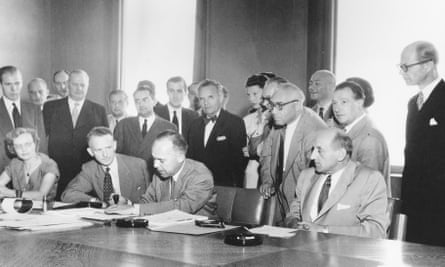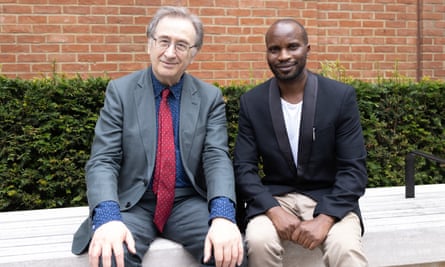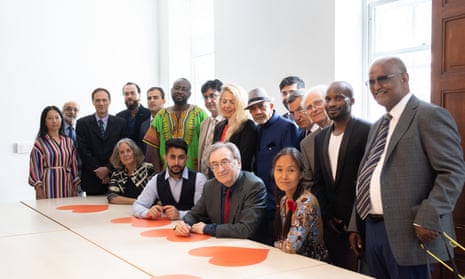Refugees from seven generations have come together to recreate a photograph of the signing of the UN refugee convention to mark the agreement’s 70th anniversary.
The gathering celebrates decades of the UK granting sanctuary to people fleeing for their lives – but also warns that the nation’s duty towards refugees must continue into the future.
The photo, created by coalition campaign Together With Refugees, brings together refugees from a range of conflicts including the Hungarian uprising, Ugandan Asians who fled Idi Amin’s regime and the ethnic cleansing of the Balkans war. In the place of the UN document, they signed an orange heart, a symbol of support for refugees.
The UN refugee convention 1951 formalised the rights of refugees under international law. It means that countries signed up to it have a legal duty to protect those fleeing persecution and serious harm in other countries. A total of 149 countries have signed up to this law, including the UK.
George Szirtes, 72, who took part in the recreation photograph, is a successful writer who arrived in the UK as a refugee in 1956 at eight years old, having fled from Hungary.

He said: “Giving safety to people fleeing war and persecution was necessary 70 years ago and I suspect it is more necessary now than ever before.”
Other refugees taking part in the photograph include author and playwright Gillian Slovo, 69, who arrived in the UK from South Africa in 1964 with her mother and two sisters. Her parents were both active in the opposition to the apartheid regime.
Hong Dam, a digital artist and writer born to a Chinese father and Vietnamese mother, fled with her family when war broke out between Vietnam and China when she was eight years old.
Aloysius Ssali, 50, was captured and tortured in Uganda because of his sexuality. The UK didn’t formally recognise sexuality as a reason for claiming refugee status until 2010 when he became one of the very first people to be granted refugee protection in the UK on the grounds of sexual orientation or gender identity.
“Celebrating 70 years of the refugee convention, especially for someone like me, a refugee in this wonderful country, I don’t take that for granted. I am who I am now because of the British people, they granted me refugee status and gave me another chance to live,” he said.

Syrian refugee Dr Saad Maida, 37, who also took part in the photograph, is a doctor working in the NHS. He arrived in the UK in 2010 to study and was given refugee status in 2014. He said: “The UN convention has had a huge impact on me. It has given refugees freedom and acknowledges that we have rights. I feel immense gratitude and hope somehow to pay that back.”
Enver Solomon, a spokesperson for Together With Refugees and CEO of the Refugee Council, said: “Seventy years ago, after the horrors of the second world war, the UK signed the Refugee convention. We gave our commitment to protect people fleeing war and persecution. Since then, it has saved hundreds of thousands of lives. These are people who have gone on to make huge contributions to our communities as proud Britons. And we must continue to safeguard this promise of safety.”
Findings from an ICM poll revealed on Wednesday that three in five people (59%) are proud that Britain has protected refugees since it signed the convention in 1951.
